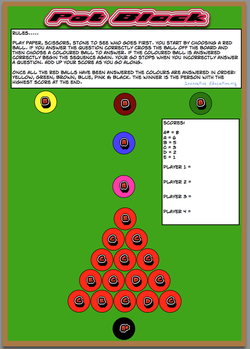| Part of the series of learning through games activities. Print off the snooker table and laminate. Prepare 21 differentiated questions from grades E to A* on a topic to correspond to each ball. These questions can be compiled over a sequence of lessons from the content covered. In small groups students compete with each other to accumulate the highest score by potting (answering) the balls (questions) using the rules of snooker. The person at the end of the game with the highest score is the winner. This activity requires tactics as choosing as the higher coloured balls requires a harder questions to be answered correctly, so students may opt to choose the lowering scoring balls to extend their go and maximse their score The game also enhances mathematics skills by the students having to use mental arithmetic to add up their score. | ||
|
0 Comments
Leave a Reply. |
Paul McCormack BSc(Hons), MRSC, FCollT, PGCE
AuthorPaul is Head of Science in a secondary school in the South West of England, and a Fellow of the College of Teachers, with an interest in developing new and innovative learning and teaching strategies to enable students to achieve their potential. Archives
April 2017
Categories
All
|


 RSS Feed
RSS Feed
